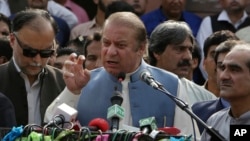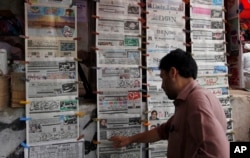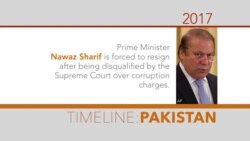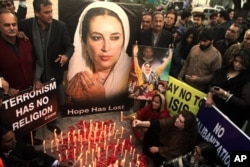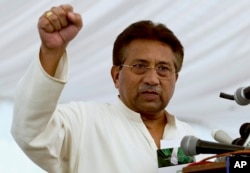Few jobs on Earth are less secure than that of Pakistani prime ministers.
The seven decades since the country’s creation have seen a revolving door at the top, with military coups, court-ordered evictions and at least one execution.
Nawaz Sharif knows it all too well. He has held and lost the job three times, benefiting and suffering from the instability that must feel like a bad case of deja vu.
Is he corrupt, as cases against him have claimed? Maybe. But his history of antagonizing the country’s army chiefs, particularly in trying to develop better relations with rival and fellow nuclear power India, is indisputable. In addition, his second term ended after he named Gen. Pervez Musharraf as army chief, changed his mind and tried to forcibly retire the general, who then staged a successful coup.
This time, because of international and domestic circumstances, the military seems to be pulling strings from behind with the assistance of the judiciary, with which Sharif also has clashed repeatedly.
Barred from office
In July, the Supreme Court barred him from office for 10 years for serving as prime minister while also getting a hefty salary in the United Arab Emirates. Expected to be indicted Monday on corruption charges, Sharif flew to London, saying he needed to attend to his ailing wife. Arrest warrants have been issued for his two sons, daughter and a son-in-law over the family’s offshore holdings.
Without naming the military directly, Sharif told a recent news conference that he knew why and who conspired to oust him. Democratically elected prime ministers have always been punished in Pakistan, he said, alluding to the history of military takeovers.
“A time has come that we proposed a cure for the 70-year-old cancer,” Sharif said.
Sharif’s political archrival Imran Khan, the former cricket star, also faces a litany of court cases over alleged corruption and assets that he allegedly failed to declare to Pakistan’s election authorities as required by law.
WATCH: A Timeline: Pakistani Rulers
History of instability
After a prolonged period of instability and inability of the ruling Pakistan Muslim League to govern, President Sikandar Mirza imposed martial law Oct. 7, 1956. Gen. Ayub Khan, the army chief and defense minister, deposed him 20 days later, put him on a plane to London, assumed absolute power and ruled for 12 years.
Khan’s coup and martial law were unconstitutional but were permitted by the courts, which established the famous “doctrine of necessity,” a term that signifies extralegal actions undertaken by the significant state actors in order to restore law and order in the country.
After the 1965 war with India ended in a stalemate, Khan’s foreign minister, Zulfiqar Ali Bhutto, resigned over a disagreement, went to the streets and rallied people, forcing Khan to resign in 1969, handing power to his army chief, Gen. Yahya Khan. His two-year rule was extremely turbulent, resulting in the country’s eastern wing breaking away as Bangladesh. Embarrassed, Yahya Khan stepped down and was replaced by his foreign minister, Zulfiqar Ali Bhutto, as the civilian leader.
Bhutto then was ousted in 1977 by the country’s top general, Zia ul-Haq, and hung after being convicted of murdering a high-profile politician, a case that some saw as a personal vendetta. Zia took over, declared martial law and ruled for 11 years.
After Zia died in an unexplained air crash, civilian elections returned to the country.
Bhutto’s 35-year-old daughter, Benazir, won, only to see her government dismissed on corruption charges by President Ghulam Ishaq Khan with strong speculation that the army had a role in the move.
Fresh elections were called that Sharif won, but the president dismissed him in 1993 on allegations of corruption and “unleashing a reign of terror” against political foes that might have included the poisoning of an army general.
Bhutto returned to power in 1993 before being dismissed three years later on corruption charges, allowing Sharif to return to power a second time. With Bhutto going into exile, activists of his Pakistan Muslim League waged an attack on the Supreme Court, damaging furniture and manhandling judges. Pakistan carried out its first six nuclear tests also during his rule.
Sharif named Musharraf as his army chief, changed his mind and tried to retire Musharraf while he was flying home, only to have the general depose him instead and take over. Sharif was exiled to Saudi Arabia.
Both Bhutto and Sharif were allowed to return in 2007. She was killed by a suicide bomber during a political rally later that year; shortly before her death, she had written to a number of friends abroad expressing concerns over her safety.
In a sympathy vote, her widower, Asif Ali Zardari, was elected president. But in 2008-13, two prime ministers, Yousuf Reza Gilani and Raja Parvez Ashraf, were ousted on contempt-of-court charges by the country’s superior court.
Sharif started his third term in 2013.
Sadaqat Jan of VOA Deewa contributed to this report.




